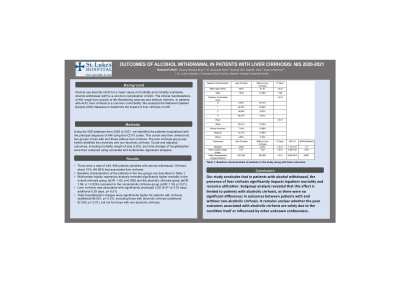Sunday Poster Session
Category: Liver
P1196 - Outcomes of Alcohol Withdrawal in Patients With Liver Cirrhosis: NIS 2020-2021
Sunday, October 27, 2024
3:30 PM - 7:00 PM ET
Location: Exhibit Hall E

Has Audio
- HU
Hameed Ullah, MD
Saint Luke's Hospital
St. Louis, MO
Presenting Author(s)
Hameed Ullah, MD1, Osama Sherjeel Khan, MD2, Muhammad Jahanzaib Khan, MD3, Behzad Gill, MD4, Sajid m. Zafar, MD4, Asad Ur Rahman, MD2
1Saint Luke's Hospital, St. Louis, MO; 2Cleveland Clinic Florida, Weston, FL; 3Mather Hospital, Northwell Health, New York, NY; 4Saint Luke's Hospital, Chesterfield, MO
Introduction: Alcohol use disorder (AUD) is a major cause of morbidity and mortality worldwide. Alcohol withdrawal (AW) is a common complication of AUD. The clinical manifestations of AW range from anxiety to life-threatening seizures and delirium tremens. In patients with AUD, liver cirrhosis is a common comorbidity. We analyzed the National Inpatient Sample (NIS) database to determine the impact of liver cirrhosis on AW.
Methods: Using the NIS database from 2020 to 2021, we identified the patients hospitalized with the principal diagnosis of AW using the ICD10 codes. This cohort was then divided into two groups: those with and those without liver cirrhosis. The liver cirrhosis group was further stratified into alcoholic and non-alcoholic cirrhosis. Crude and adjusted outcomes, including mortality, length of stay (LOS), and total charges of hospitalization were then analyzed using univariate and multivariate regression analyses.
Results: There were a total of 448, 999 patients admitted with alcohol withdrawal. Of these, about 10% (46,664) had associated liver cirrhosis. Baseline characteristics of the patients in the two groups are described in Table 1. Multivariate logistic regression analysis revealed significantly higher mortality in the overall cirrhosis group (aOR: 1.60, p=0.008) and the alcoholic cirrhosis group (aOR: 1.56, p = 0.026) compared to the non-alcoholic cirrhosis group (aOR: 1.39, p=0.21). Liver cirrhosis was associated with significantly prolonged LOS (5.47 vs 4.33 days, additional 0.35days, p< 0.01). Total hospitalization charges were significantly higher for patients with cirrhosis (additional $4,081, p< 0.01), including those with alcoholic cirrhosis (additional $7,305, p< 0.01), but not for those with non-alcoholic cirrhosis.
Discussion: Our study concludes that in patients with alcohol withdrawal, the presence of liver cirrhosis significantly impacts inpatient mortality and resource utilization. Subgroup analysis revealed that this effect is limited to patients with alcoholic cirrhosis, as there were no significant differences in outcomes between patients with and without non-alcoholic cirrhosis. It remains unclear whether the poor outcomes associated with alcoholic cirrhosis are solely due to the condition itself or influenced by other unknown confounders.
Note: The table for this abstract can be viewed in the ePoster Gallery section of the ACG 2024 ePoster Site or in The American Journal of Gastroenterology's abstract supplement issue, both of which will be available starting October 27, 2024.
Disclosures:
Hameed Ullah, MD1, Osama Sherjeel Khan, MD2, Muhammad Jahanzaib Khan, MD3, Behzad Gill, MD4, Sajid m. Zafar, MD4, Asad Ur Rahman, MD2. P1196 - Outcomes of Alcohol Withdrawal in Patients With Liver Cirrhosis: NIS 2020-2021, ACG 2024 Annual Scientific Meeting Abstracts. Philadelphia, PA: American College of Gastroenterology.
1Saint Luke's Hospital, St. Louis, MO; 2Cleveland Clinic Florida, Weston, FL; 3Mather Hospital, Northwell Health, New York, NY; 4Saint Luke's Hospital, Chesterfield, MO
Introduction: Alcohol use disorder (AUD) is a major cause of morbidity and mortality worldwide. Alcohol withdrawal (AW) is a common complication of AUD. The clinical manifestations of AW range from anxiety to life-threatening seizures and delirium tremens. In patients with AUD, liver cirrhosis is a common comorbidity. We analyzed the National Inpatient Sample (NIS) database to determine the impact of liver cirrhosis on AW.
Methods: Using the NIS database from 2020 to 2021, we identified the patients hospitalized with the principal diagnosis of AW using the ICD10 codes. This cohort was then divided into two groups: those with and those without liver cirrhosis. The liver cirrhosis group was further stratified into alcoholic and non-alcoholic cirrhosis. Crude and adjusted outcomes, including mortality, length of stay (LOS), and total charges of hospitalization were then analyzed using univariate and multivariate regression analyses.
Results: There were a total of 448, 999 patients admitted with alcohol withdrawal. Of these, about 10% (46,664) had associated liver cirrhosis. Baseline characteristics of the patients in the two groups are described in Table 1. Multivariate logistic regression analysis revealed significantly higher mortality in the overall cirrhosis group (aOR: 1.60, p=0.008) and the alcoholic cirrhosis group (aOR: 1.56, p = 0.026) compared to the non-alcoholic cirrhosis group (aOR: 1.39, p=0.21). Liver cirrhosis was associated with significantly prolonged LOS (5.47 vs 4.33 days, additional 0.35days, p< 0.01). Total hospitalization charges were significantly higher for patients with cirrhosis (additional $4,081, p< 0.01), including those with alcoholic cirrhosis (additional $7,305, p< 0.01), but not for those with non-alcoholic cirrhosis.
Discussion: Our study concludes that in patients with alcohol withdrawal, the presence of liver cirrhosis significantly impacts inpatient mortality and resource utilization. Subgroup analysis revealed that this effect is limited to patients with alcoholic cirrhosis, as there were no significant differences in outcomes between patients with and without non-alcoholic cirrhosis. It remains unclear whether the poor outcomes associated with alcoholic cirrhosis are solely due to the condition itself or influenced by other unknown confounders.
Note: The table for this abstract can be viewed in the ePoster Gallery section of the ACG 2024 ePoster Site or in The American Journal of Gastroenterology's abstract supplement issue, both of which will be available starting October 27, 2024.
Disclosures:
Hameed Ullah indicated no relevant financial relationships.
Osama Sherjeel Khan indicated no relevant financial relationships.
Muhammad Jahanzaib Khan indicated no relevant financial relationships.
Behzad Gill indicated no relevant financial relationships.
Sajid m. Zafar indicated no relevant financial relationships.
Asad Ur Rahman indicated no relevant financial relationships.
Hameed Ullah, MD1, Osama Sherjeel Khan, MD2, Muhammad Jahanzaib Khan, MD3, Behzad Gill, MD4, Sajid m. Zafar, MD4, Asad Ur Rahman, MD2. P1196 - Outcomes of Alcohol Withdrawal in Patients With Liver Cirrhosis: NIS 2020-2021, ACG 2024 Annual Scientific Meeting Abstracts. Philadelphia, PA: American College of Gastroenterology.
